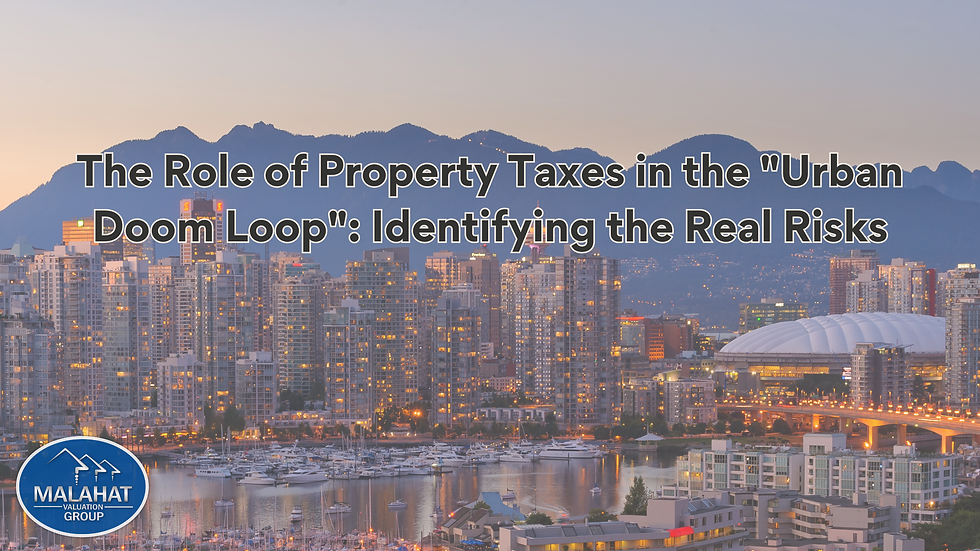The Role of Property Taxes in the "Urban Doom Loop": Identifying the Real Risks
- Ernest Bednarz
- May 28, 2024
- 3 min read

The COVID-19 pandemic has fundamentally transformed the way we work, with remote work becoming a permanent fixture for many businesses. This shift has had profound impacts on urban centers, particularly concerning office real estate values and municipal revenues. The "doom loop" theory, first introduced by Columbia Professor Stijn Van Nieuwerburgh, encapsulates these cascading effects.
What is Doom Loop Theory?
In his working paper titled The Remote Work Revolution: Impact on Real Estate Values and the Urban Environment, Professor Stijn Van Nieuwerburgh explored the implications of widespread remote work on urban office spaces. He later co-authored Work from Home and the Office Real Estate Apocalypse, which predicted a staggering 49% long-term decline in New York City’s office stock. According to the doom loop theory, declining office values lead to reduced property tax revenue, prompting government cutbacks on services and infrastructure. This, in turn, causes further migration from downtown areas, exacerbating the decline in real estate values.

Figure 1: Repercussions of commercial real estate valuation on governments
Current Trends in Office Occupancy
Reports from CBRE indicate a dramatic drop in office occupancy rates across major North American cities. With many companies continuing to embrace remote work, the demand for office space has plummeted, leading to significant financial challenges for property owners.
Figure 2: Office vacancy rates – US and Canada – select cities

Discrepancies Between Market Values and Assessments
Property tax assessments often lag behind current market values due to the timing of the valuations and the methodologies used. Assessments are based on legislated valuation dates, which can be significantly outdated.
For example:
New York, Houston, Dallas, Calgary, and Vancouver update assessments annually.
Chicago's property tax valuations still reflect 2021 market values.
Toronto's assessments are based on values from January 1, 2016.
Mass appraisal techniques, which rely on limited data and standardized valuation parameters, can further contribute to discrepancies. These methods may exclude atypical transactions and market anomalies, leading to assessments that do not accurately reflect current market conditions.
In 2023, these factors have resulted in increased disparities. In some instances, property tax assessments have risen even as market values have declined. For example, New York City’s preliminary 2025 values show assessed increases despite falling market values, highlighting the disconnect between official assessments and the real estate market.
The Rise of a New Doom Loop: The Impact of Unchanging Property Taxes
Currently, office building values are declining due to difficulties in maintaining occupancy, resulting in strained or even negative net operating incomes (NOI). With rising interest rates, refinancing becomes more challenging. Even if property tax assessments are lower than current market values, keeping property taxes steady or increasing them can create another type of doom loop. As property costs rise, NOI decreases further, limiting the owner's ability to maintain the property. This makes the property less attractive to tenants, leading to reduced rents or occupancy rates, which in turn causes the property's value to continue declining.
Conclusion
The urban doom loop theory underscores the potential for a vicious cycle of declining property values and reduced municipal revenues, which can destabilize urban centers. As office occupancy rates continue to fall and market values decline, it is crucial for policymakers to address these discrepancies and adapt to the changing landscape of urban real estate. Proactive measures will be essential to prevent the widespread economic fallout predicted by the doom loop scenario.
Information in this post from Altus Group.
Malahat Valuation Group specializes in business valuation and real estate appraisals to owners of privately owned companies and their professional advisors.
When owners need to leverage, sell or reorganize their assets, we answer the age-old question "What is it worth?".
We provide our clients and their advisors peace of mind by preparing professional valuations that stand up to scrutiny from lenders, the Courts, and the Canada Revenue Agency.
Malahat Valuation Group Inc.
(250) 929-2929





















Comments